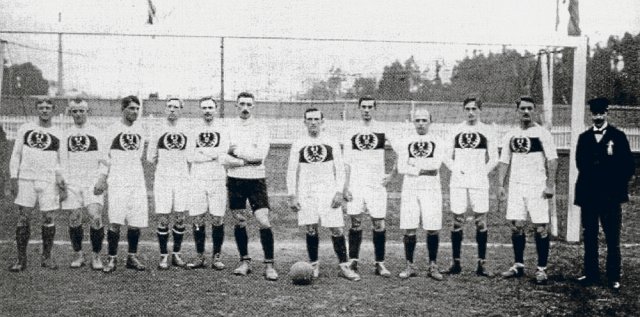“Sixteen goals against the Tsar!” Adolf “Adsch” Werner is the black-haired, mustachioed man in the middle.
Photo: Archive
After one of your readings, to my horror, you said you didn’t want to write another book. Fortunately, you relapsed with “16:0”. Why?
My announcement of my final retirement was not flirtatious, and the world press reacted very calmly. At the time I had nothing left on my mind, the bottle was empty. I didn’t suffer one bit and was never a romantically compulsive writer. But the tormentors from Transit Publishing gave no peace. As if I were important and Germany was impatiently waiting for something new from me. Total nonsense, of course. But also soothing, this affection, this trust. And so I tried to fill my bulb a little again. Suitable for the upcoming European Championship with 112-year-old football.
Interview

Milena Sous
Dietmar Sous, born in 1954, is a chronicler of plebeian life. His laconic-comic narrative prose is unique in German literature. In his new short novel “16:0” he tells the story of the left-wing chimney sweep Adolf “Adsch” Werner, goalkeeper for Holstein Kiel, who achieved a legendary victory with the national football team against the Russian team during the Olympic Games in Sweden in 1912: “Sixteen goals against the Zaren!” – the DFB team’s biggest victory in history.
“16:0” provides a lot of contemporary color: the hurray patriotism, the bossiness, the submissive spirit, the growing belligerence in the German Empire. One is amazed at how vividly you resurrect the early 20th century in such a slim book. You were also interested in creating a mood, right?
At first I just wanted to find a topic. This 16-0 win by the German national team at the 1912 Olympics has long fascinated me as a statistics erotician. 16:0 against Russia, not against the Vatican! But what I found more interesting than the magnitude of the victory was that the last goal was scored in the 69th minute. What the fuck was going on in the last 21 minutes? I didn’t find a match report that went into this, only extremely astonishing sentences like: “The game went past the Russians and their goalkeeper was weak.” I was apparently alone in my astonishment. Nobody even came up with the idea of inviting “my” hero, the goalkeeper Adolf “Asch” Werner, to the “Aktuelle Sportstudio” and interviewing him. The man lived until 1975. But well, this lack of interest, this fixation on the miracle in Bern and the 3:4 against Italy at the World Cup in Mexico was one, perhaps mine Chance. I always found the early 20th century extremely exciting, especially the question of how the First World War came about. I always enjoyed listening to the stories of my alert Grandpa Heinrich, born in 1896 – I guess that’s what we call the history of mentality today. You have already mentioned key keywords: submissive spirit, nationalist glorification of war, but on the other hand also the political strengthening of the working class, despite all the harassment “from above”.
In your book, Adolf Werner is a good left-wing man who wants the republic and is not particularly patriotic. Is this historically proven?
Adsch’s international matches and successes with Holstein Kiel are documented, and I also knew that he was a chimney sweep and had two younger brothers. That’s it. So I was free to go about my usual business and make myself a hero. I wouldn’t have wanted to live next door to a well-adjusted goalkeeper loyal to the emperor who was walking through Kiel’s city park with his strict fiancée for months. But it was quite easy to work with a left-wing social democrat in an authoritarian state.
They also resurrect the amateur beginnings of football. There are also secret bonuses and transfer fees, but of course in a different context. Are you a football romantic?
Through and through. Champions League – ugh, I can’t imagine it. I tune out 18-year-old millionaires who breathe their comments and other wisdom into every microphone that is presented to them. I enjoyed watching the games of my home club FC 66 Breinigerberg, between the ninth and tenth league, and was very nervous. But that’s the end of it. The much more ambitious neighboring club merged my club to death.
You are a big romantic anyway. Her female characters are particularly apart in all of her books.
I don’t agree with everything Aj does and says, but I completely agree with him when he says that there is nothing in the whole world more beautiful and exciting than women.
But there is also another cruel teacher. This character plays a role in many of your novels and stories. In your blurb you write that you “survived” the ancient language Goethe-Gymnasium in Stolberg. What happened to you?
Unfortunately, in the Swinging Sixties, not only were the Beatles, free love and miniskirts in power, the NSDAP also ruled the Federal Republic. Chancellor Kiesinger and the terrible lawyers were not isolated cases. At my – I’ll say this mildly – rather conservative-liberal school, there was a German teacher who, day after day, year after year, led a regime of terror that literally destroyed some of his classmates. For this teacher, pedagogy meant: humiliation, punishment and training of the will – training according to his brown will. In retrospect, this was an excellent object lesson. But I’m not grateful to this commander for that.
Her diction in “16:0” is different than in her last novels. Did you want to adapt the language of the early 20th century?
My sound just happens to me, there’s nothing calculated. I knew that the kickers back then liked to resort to anglicisms, much to the annoyance of the language purifiers who existed long before today’s gender enemies, and I followed that sparingly. I have largely avoided using old or extinct words and phrases so that it doesn’t seem like it was done.
One last question about language. They don’t need much space to profile their characters three-dimensionally, and yet it reads extremely smoothly and not overly compressed. How do you do that?
Sit down, put your cell phone away, turn off the radio, postpone any debauchery until the next month, stay tuned.
Dietmar Sous: 16:0. A story. Transit, 96 S., born, 18 €.
Subscribe to the “nd”

Being left is complicated.
We keep track!
With our digital promotional subscription you can read all issues of »nd« digitally (nd.App or nd.Epaper) for little money at home or on the go.
Subscribe now!
judi bola online sbobet88 link sbobet sbobet88
